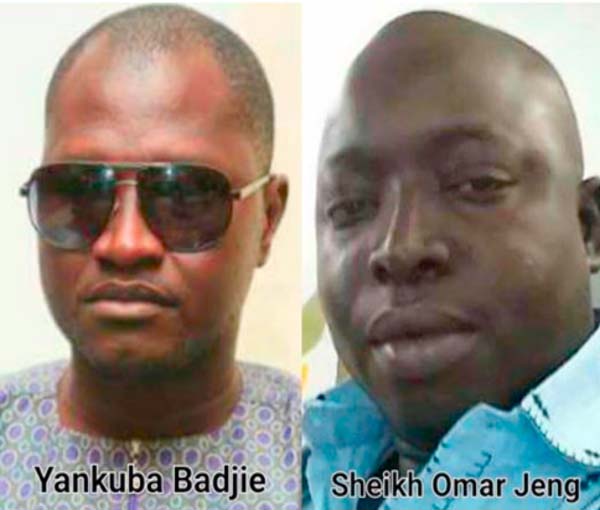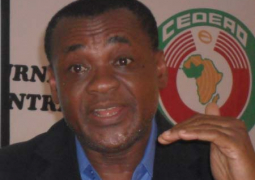
Defence
team in the criminal trial involving nine former NIA officials yesterday
questioned the competence of the Deputy Director of Public Prosecution, M.B.
Abubacarr, in his handling of the case.
They
were arguing over summons on notice filed before Justice Kumba Sillah Camara of
the Banjul High Court.
The
nine officials are Yankuba Badjie, the former Director General of the NIA,
Louie Richard Leese Gomez, Saikou Omar Jeng, Baboucarr Sallah, Yusupha Jammeh,
Haruna Susso, Tamba Mansaray, Lamin Darboe and Lamin Lang Sanyang.
They
are charged with twelve counts of criminal offences of conspiracy to murder,
murder, assaults causing actual bodily harm, conspiracy to commit misdemeanor,
forgery and making documents without authority.
When
the case was called, the Deputy Director of Public Prosecution, M.B. Abubacarr,
announced his representation for the state whilst the defendants were
represented by C.E. Mene, E. Chime, Edward Gomez, M.B. Johnson, S. Kenedy, U.
Achigbue and D. Dago.
At
this juncture, the presiding Judge stated that the matter was slated for
hearing on summons on notice.
In
moving the application, Lawyer Mene submitted that in the sermons they are
seeking an order of the court to strike out the information dated 20 March 2017
and filed on the same day for want of jurisdiction.
He
said the criminal case was not instituted in accordance with the due process of
the law and the requisite provisions of the 1997 constitution of the Republic
of The Gambia.
Counsel
Mene said the application was supported by a 9-paragraph affidavit, adding that
tthey are relying on all the paragraphs, particularly paragraph 3 to 8.
He
urged the court to strike out the information (charges) and discharge the
accused persons.
“I
am aware that the office of the Director of Public Prosecution (DPP) is secrete
and distinct from the office of the Attorney General. I am aware as at 20 March
when the criminal case number HC/068/17/CR/012/AO was purportedly filed by M.B.
Abubacarr and that there was no incumbent DPP at the time,” he submitted.
He
further submitted that there was no DPP appointed by the president of the
republic as enshrined in the 1997 constitution.
He
added that M.B. Abubacarr was not competent to exercise the powers of the DPP
in the absence of the incumbent DPP and that the said charges filed by M.B.
Abubacarr were null and void.
Lawyer
Mene said the respondent filed a 10-paragraph affidavit of opposition wherein
they said the DPP was not a distinct office in the public service and that the
Attorney General has control over their office which he exercises through the
office of the DPP.
Lawyer
Mene said the prosecuting authority has now been directly under the DPP as per
section 85(1) of the 1997 constitution which stated that ‘the Director of
Public Prosecution shall have power in any case in which he or she considers it
desirable to do so, and subject to the approval of the Attorney General’.
He
added that the only thing the DPP requires from the Attorney General was
approval just like the National Assembly passes a bill and the president
assents to it but that one could not do the work of the other one.
Lawyer
Mene submitted that the constitution has not given any provision as to what
should happen when there was no incumbent DPP.
He
inquired to know who was directing if there was no incumbent DPP.
“If
my lady could turn to the signature page it is signed by M.B. Abubacarr from
the A.G Chambers and it does not indicate that he is acting as the DPP,” he
said.
“The
law has not created any Deputy Director of Public Prosecution (DPP) so it is
not known to law. The charges are not consistent with the 1997 constitution.
This case, therefore, is not initiated by due process of the law,” he added.
He
argued that if there was no incumbent DPP then there was nobody to delegate
responsibility.
He
finally submitted that the case was not instituted by due process of the law
and not in accordance with the 1997 constitution of the Republic of The Gambia.
Counsel
Moses Richard one of the defence team associated himself with the submission of
Lawyer Mene and Counsel Achigbue and D. Dago also associated themselves with
the submission of Lawyer Mene.
However,
Counsel E.A. Gomez, who represented the 2nd accused, told the court the summons
do not affect his client.
In
reply, the Deputy Director of Public Prosecutions (DDPP) M.B. Abubacarr, said
they were vehemently opposing the application and in furtherance to that they
had filed a 12-paragraph affidavit of opposition.
He
further told the court that they were relying on all the paragraphs of the
affidavit, particularly paragraph 5 to 11.
He
said although section 84 of the constitution created the office of the DPP, it
does not mean that it is distinct and separate from the office of the Attorney
General.
At this juncture, he read section 85 of the
1997 constitution and stated that the key word there is ‘subject to the
approval of the Attorney General’.
Therefore,
he said, the DPP shall be subject to the direction or control of the Attorney
General, adding that the provision clearly shows that the constitution intended
to make the office of the DPP part and parcel of the Attorney General not a
distinct office as alluded to by the defence counsel.
M.B.
Abubacarr argued that the prosecuting powers are vested on the Attorney General
and the DPP acts as an agent.
Clearly,
he added, the DPP was rendered inactive in the absence of approval of the
Attorney General.
He
argued that the defence counsel failed to substantiate that there was no
incumbent DPP and he who asserts must prove.
He
said the office of the DPP is a constitutional creation that defines and
delegates duties which make the office a public authority that exists.
Therefore,
he added, whether the office of the DPP is occupied or not, the office
continues to function.
He
submitted that the application of the defence was misconceived, untenable and
should be “dismissed”.
He
said section 84 and 85 of the constitution seems to call for an interpretation
as to the powers of the Attorney General and DPP and that being the case the
powers should be interpreted at the Supreme Court of The Gambia.
“I
refer the court to section 127(1) (a) of the 1997 constitution of the republic
and enjoined this court to stay off proceedings in this case and refer the
matter to the Supreme Court for interpretation,” submitted Lawyer M.B.
Abubacarr.
Replying
on points of law, lawyer Mene said referring the case to the Supreme Court
would deny the accused persons the right to expeditious trial.
Counsel
Richards said there was no DPP and the information filed by the Ministry of
Justice as distinct was null and void and should be struck out and the accused
persons be discharged because the due process of the law was not followed.
The
case was adjourned until 18 and 24 April at 12noon for mention and 2 May 2017,
for ruling on the sermons.


